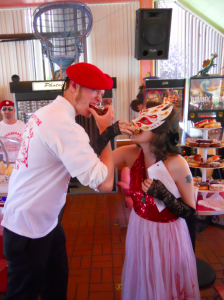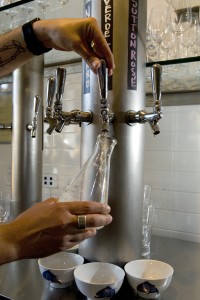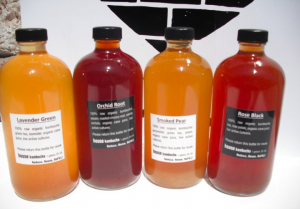The great thing about a down economy is that inventiveness and creativity are not tied to GDP. During the Great Depression, G. Frederick Smith’s chemical company discovered and introduced the world to the first can of whipped cream. Eighty-plus years on, Smith’s invention still offers a pleasure that’s rarely matched—standing in front of the refrigerator and squeezing a blast of ice cold whipped cream into your mouth. In today’s Great Recession, there are many great food purveyors who exude that same level of creativity. We present to you six who show that creativity and resourcefulness are alive and well in this recessionary economy.

Voodoo Doughnut
Portland, OR
How do you make a perfect doughnut with maple frosting better? Add bacon! That’s what Kenneth “Cat Daddy” Pogson and Tres Shannon, both 44, have done at Voodoo Doughnut. Not impressed? How about the Captain my Captain doughnut with vanilla frosting and Captain Crunch cereal on top? Or the Mango Tango raised yeast doughnut filled with mango jelly and topped with vanilla frosting and Tang. Perhaps more creative than their flavor combinations, however, is the fact that they cater weddings!
“When you do Voodoo you are supposed to do rites,” says Pogson. “Why not perform one of the happiest rites there is, weddings?” It’s no magic, just smart business. Weddings provide a side-business that takes advantage of the off-hours of breakfast food. Pogson says they have a constant flow of weddings and that most couples come for the Voodoo experience then the low cost. It can’t hurt that a $1,000 wedding cake in this economy is tough to swallow, a bacon-topped doughnut on the other hand…
OTD
San Francisco, CA
Sitting down for dinner and wanting a glass of wine is not uncommon. Asking what the bartender has on tap, on the other hand, is something new that’s starting to catch on in today’s economy where every dollar—and ounce—counts. Charles Phan’s recently opened restaurant, OTD, provides 12 different wines on tap. The benefit is that the wine is cheaper, greener and a fresher alternative to bottled wines served by the glass. If this sounds like a 21st-century makeover of boxed wine, you’d be wrong. Their priciest glass comes in at $16.50 for the La Severita di Bruto Sauvignon Blanc. The wine is stored in kegs like beer and uses a low-pressure system to push the wine out without creating a fuzzy brew. Since the wine never gets exposed to oxygen, the wine stays fresh and Phan doesn’t have to throw away half bottles.
Up the Creek Again
Hyannis, MA
Inspired by Depression-era pricing, John Evans, owner of Up the Creek Again, recently began offering 99-cent fish and chips. The fish served in the dish is the catch of the day, “scrod.” With the Great Recession putting many people in hard times that are reminiscent of those during the Great Depression, the name of Evans’ restaurant seems a bit serendipitous. To reverse sagging sales and to bring customers back to his restaurant, the new pricing has given both a paddle.
To offer these low prices, however, Evans has changed a few things. For example, he serves the fish and chips in paper boats instead of dishes to cut back on dishwashing costs. He also requires a two-drink minimum (not necessarily alcoholic) with purchase. The new pricing has worked so well for Up the Creek Again that Evans has started offering baby back ribs and corn on the cob for $3.99 on Saturdays.
House Kombucha
San Francisco, CA
After graduating law school and passing the California bar exam in 2008, Rana Chang, 30, worked part-time as she searched for a permanent legal career. “The down economy is really what helped create House Kombucha,” says Chang. Underemployed and thirsty last summer, Chang and Asad Modarai, 44, a San Francisco public school teacher, began making the only drink that would refresh their parched mouths, kombucha (a fermented sparkling tea).
“We don’t normally drink bottled beverages due to the waste issues involved, but kombucha is so addictive, when you want it, nothing else will do,” exclaims Chang. Recognizing a demand and the waste that followed with the discarded bottles, Chang set up Kombucha Refill Stations at local eateries to encourage patrons to reuse and recycle their bottles. Chang also sells the kombucha to local stores.
“I knew that most stores were not interested in going through the ‘trouble’ of reusing bottles,” says Chang, “but some understood the environmental importance right away and were glad to collect empties.” Interestingly, Chang says stores that actively remind their customers to return their bottles sell substantially more kombucha than stores that don’t.
MAWL
Garden Grove, CA
In 2006, a 20-something David Scales was looking to open a wine shop, but kept running into landlords who were afraid to lease space to a young kid, especially one who wished to sell alcohol. Rather than drink his inventory, Scales persisted and after seven months landed a space in an unusual location—an office park. Moreover, the office park was in the less-affluent area of Orange County (locations of “The Hills” and “The Real Housewives of Orange County”).
“I did the demographic research and there are really no wine drinkers in Garden Grove,” says Scales. Funny thing though, they found him. In late 2006, MAWL (music, art, wine, love) opened and began selling upscale wine. When the economy tanked however, Scales, in his office park wine boutique, shifted his sales strategy from $100 to $20 bottles of wine and began renting wine lockers. “There have been a lot of shops closing around us,” says Scales, but credits his cheap rent and customer service as staples of his survival.


Is your resto doing something creative like these?–> RT @ToqueMag: Serving Up Creativity in a Down Economy http://bit.ly/b623TD